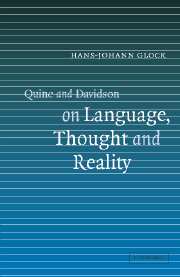Book contents
4 - Truth
Published online by Cambridge University Press: 22 September 2009
Summary
Quine and Davidson base their accounts of truth on Tarski (section 1). But although they treat Tarski's semantic theory as the indispensable starting point, they also stress its limitations. Section 2 deals with Davidson's reasons for denying that Tarski has said all there is to say about truth, and his claim that truth is indefinable. I shall resist the latter claim, and argue that Tarski's theory leaves even larger gaps than Davidson recognizes. In section 3, I maintain that all three go wrong in treating truth as a property of sentences and thereby relativizing it to languages. But while I condemn this sententialism, I defend Davidson's pragmatist claim that the concept of truth indirectly presupposes the linguistic activities of human beings. Next I turn to three prominent accounts of truth that Davidson regards not just as incomplete but as inadequate, namely antirealism and correspondence theories on the one hand, deflationism on the other. I provide a qualified defence of Quine's and Davidson's attacks on correspondence theories and epistemic accounts (section 4). Section 5 concludes that the proper moral is to adopt a version of deflationism, though not the one implicit in Quine's disquotational theory.
The legacy of Tarski
According to Aristotle, ‘to say of what is that it is, and of what is not that it is not, is true’.
- Type
- Chapter
- Information
- Quine and Davidson on Language, Thought and Reality , pp. 102 - 136Publisher: Cambridge University PressPrint publication year: 2003



